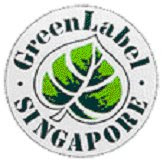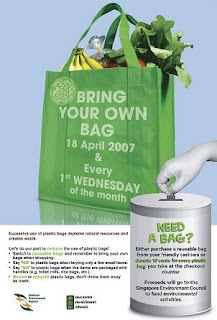Monday, May 14, 2007
Singapore Green PlanMy Reflections:
The Singapore Green Plan (SGP) is a plan for aiding Singapore to become a city with high standards of public health which is pleasant to live in and where the Singaporeans care for the environment. It was presented at the 1992 Earth Summit held in Rio de Janeiro. At the summit, more than 100 countries committed themselves to ensuring that minimal damage is done to the environment in the process of developing their countries. This scheme raises global awareness of environmental conservation and thus it is a form of globalization. In addition, the active participation of so many countries all over the world shows that the world does spare a thought for the environment and that the world has a common objective, that is, to protect and conserve the environment.

There are various action programmes in Singapore Green Plan including environmental education, resource education, clean technologies, environmental technology, nature conservation and noise management.
One of the action programmes in Singapore Green Plan involves public education on environmental issues. Students are taught of environmental issues in Singapore through subjects such as Geography etc. Besides the “Bring Your Own Bag” campaign that is launched recently, there is another campaign which is the annual “Clean and Green week” which aims to encourage Singaporean to participate actively in protecting the environment.
In addition, public is encouraged to purchase products that are environmentally friendly and such products usually carry a GreenLabel. The label serves to allow easy identification of environmentally friendly products. When visitors from foreign countries to Singapore purchase such environmentally items, they will know that such an environmental protection scheme is ongoing. This is also a form of globalization.

Another action programme of Singapore Green Plan is clean technologies. The SGP aims to reduce air pollution which includes using cleaner fuels to generate electricity, making more efficient use of transport system and promoting cleaner industrial processes. For example, new cars have catalytic converters to convert toxic exhaust gases into less harmful ones before they are released into the air. In Britain, different rates for parking permits based on vehicle fuel emissions have led a string of other areas around Britain following suit, i.e. there is cheaper parking for greener cars. In Singapore, cars are fitted with catalytic converters while in Britain, cheaper parking rates are offered to greener cars. Though these two approaches are different and that they are executed in countries, they both aim to reduce the amount of harmful gases emission and to combat air pollution. From here, globalization can be seen in from the similar objective that both Singapore and Britain have to minimize air pollution. It is also certain that many other countries are reducing air pollution, but with varying approaches.
The public transport system is also constantly improved to encourage the use of public transport instead of private cars as this is a more efficient way use of energy. In particular, the Mass Rapid Transit (MRT) is a cleaner mode of transport as it uses electricity instead of patrol. Again, MRT is not only confined to Singapore but is also present in other countries such as Japan, America and Europe etc. Thus, it can be seen that MRT is globalized and that MRT is definitely environmental beneficial.

Environmental technology is also one of the action programmes of SGP. Environmental technology aims to develop Singapore into a centre for environmental technology. As Singapore is already famous for being a clean and green city, we want to share our knowledge, skills and experience with neighbouring countries through trainings, conferences and workshops etc. Globalization is present when Singapore shares her knowledge and skills in taking care of the environment with other countries. At the same time, Singapore can also pick up new knowledge and skills during the interactions with other countries. This brings different countries closer and more bonded together.
At the same time, Singapore aspires to increase knowledge and skills in environmental protection. Thus, Singapore has encouraged foreign environment-related companies to set up offices here and various incentives and benefits such as fundings for research are offered to these companies. Other countries are made aware of such scheme and this is also a form of globalization.
In the midst of progression and development, the environment cannot be neglected and we should not inflict further damage to it. The Singapore Green Plan is our blueprint for enhancing the environment for everyone living and working in Singapore.
Environmental and Health Expert,
Yu Yang
Environmentalized at 11:04 PM
Tuesday, May 8, 2007
Singapore's "Bring Your Own Bag" CampaignMy Reflection:
As mentioned over and over again, the depletion of natural resources, different kinds of pollutions, global warming and ozone layer depletion arise mainly from our activities, in the process of modernization and globalization. These problems have resulted because we misused our natural resources and abused the Earth but it is not too late for us to do something about all these problems. We can play a part by conserving the environment.


Singapore’s “Bring Your Own Bag” campaign that is launched this year, 18 April, is one good example that illustrates national effort to protect the environment. This is a great start of adopting environmental-friendly practices, and probably a stepping stone for future campaigns and environmental-friendly practices. This recycling campaign aims to encourage the use of reusable shopping bag and fewer plastic bags by imposing charge for every plastic bag taken by the consumer. The common mindset of consumers that the cutting down of usage of a few plastic bags is merely an insignificant effort of environmental conservation, and the irresistible convenience brought about by plastic bags, are two great obstacles standing in the way of this campaign. Most people are reluctant to take on the green challenge and instead, are willing to fork out a few cents for the plastic bags to spare themselves the trouble of bringing their own reusable bag. This was exactly what I experienced at FairPrice supermarket on that day when the campaign was first launched. Hence, I think a better approach is to increase the charge for every plastic bag used.
Singapore has encouraged environmentally friendly practices and this national effort requires the active participation of individuals in order for effective environmental conservation to take place. Though it may seem that an individual effort is insignificant, but the amount of plastic bags can be greatly reduced if everyone takes part actively in the campaign.
Currently, only 7 selected supermarkets are involved in this recycling campaign and it would be great if the scheme is implemented island-wide, that is, for every supermarket and mini mart that can be found in Singapore. It would be even better if such a campaign can be globalized and implemented world-wide. Conservation needs everybody’s participation. If all of us were to do our little bit in caring for the environment, the world will soon be a better place.
Environmental and Health Expert,
Yu Yang
Environmentalized at 12:34 AM
About
Gui Yu Yang
--> belongs to staplebullets.
--> belongs to 2B/06
An ENVIRONMENTAL AND HEALTH expert ;)
He knows about Globalization too!




